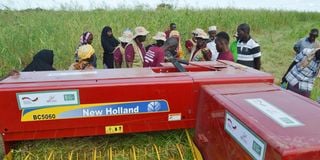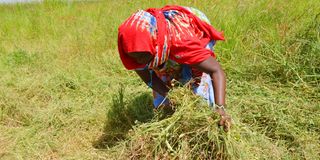Premium
Tana herders make hay while January sun shines

Pasture farmers at the Hola Irrigation Scheme in Tana River County being trained on how to use a combined mower donated by the Anglican Development Services.
They say make hay while the sun shines.
Herders in Tana River County are taking this proverb literally as they venture into the business of haymaking as a measure to avert future effects of drought.
At the Hola Irrigation Scheme, more than 50 herders have embarked on fodder propagation for sale and domestic use.
The programme, supported by the Anglican Development Services, has seen farmers trained on sustainable pasture management practices, haymaking, and marketing as an alternative source of income.
In an interview with Nation.Africa, the herder said the idea is an opportunity to compensate for the losses they incurred during the dry season as well as earn a living.
"I had 70 cows before the drought. By the time the drought ended, I had only 10 left that could not even fetch a cup of milk," said herder Ahmed Bale.
Haymaking, he said, has a wide market in the North Coast area and the Northern frontier counties throughout the year and hence worth practising.
A bale of hay sells for Sh200, with herders banking on the Boma Rhodes grass variety.
The herder believes that all pastoralist communities should be trained on sustainable livestock keeping practices to save them from the hustle of long-distance travel in search of pasture.
He noted that dry hay is good for livestock, as it contributes to body growth and also inspires production from cows.
"If you feed your cows on this, they develop a good body and increase milk production. Such cows fetch a good fortune in the market without a lot of bargaining," he said.

Fatima Ali, a pasture farmer, collects grass for haymaking at the Hola Irrigation Scheme in Tana River County.
Fatima Ali acknowledged that haymaking is a game changer in the livestock rearing practices in the county.
Zero-grazing practices
Ms Ali noted that with growing infrastructure development in the county and more in the pipeline, herders will in the next 20 years of devolution run out of grazing space and need to embrace haymaking and pasture production for zero-grazing practices.
"We can't keep depending on rain. It has disappointed us and climate change is no secret to any serious herder. This is the way to go for everyone who wants to save their livestock for their children and coming generations," she said.
Tana River County Agriculture and Livestock executive Mwanajuma Mabuke noted that pasture had been the main cause of conflict in the county.
This happened due to a lack of sustainable ways of livestock rearing, she said.
"Last year, people died fighting for pasture land, even efforts towards development are challenged by communities claiming grazing land, but when drought hits hard, that land does not give them at their time of need. It remains bare and hence the need for them to embrace this practice," she said.
Ms Mabuke encouraged more members in herder communities to venture into fodder production and haymaking, noting that the county administration will provide the necessary support to interested groups.
She reiterated that the old practice of moving with livestock has been bypassed by time, as it fatigues livestock and reduces their market value.
"Zero-grazing will save herder communities a lot of time and resources," she said.
She assured herders of the county government's support in marketing and promoting sustainable livestock practices.





